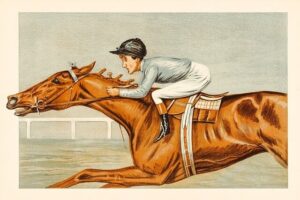 If you enjoy horse racing, whichever code, you may have considered the role of the jockey. You’ve probably praised, cursed and been ambivalent about their performance.
If you enjoy horse racing, whichever code, you may have considered the role of the jockey. You’ve probably praised, cursed and been ambivalent about their performance.
A memorable day on the 26th September 1996, saw the Magnificent Seven, Frankie Dettori winning every race on the card at Ascot. Reputedly, it cost bookmakers over £30M.
Perhaps you were a fan of Lester Piggott, nicknamed The Long Fellow because of his relatively tall stature for a professional jockey at 5-feet 8-inches. He was also known as the ‘housewives favourite’ for a period when he won nine Derbys including the Epsom Classic.
Jockeys come in all shapes and sizes, male and female.
Back in the day when handicaps fielded a lowest weight of 7st 7lb it would be noticeable one or two jockeys looked much smaller than the others. I remember Gary Bardwell, known as the ‘Angry Ant’, one of top lightweight jockeys and former dual champion apprentice entering the paddock at Great Yarmouth. A man the size of a small child. Poetry in motion. Bardwell 4 ft 10in tall struggled to find rides when the minimum weight increased to 7st 12lb. A 19 year career saw him achieve over 400 winners. However, his final season saw just 1 winner from 138 rides. Bardwell’s agent, Shippy Ellis said: ‘Gary was an absolute joy to work with. He was always cheerful and would go anywhere to ride anything for anybody. Whatever chance his mount had, he would always give 100%.’
However, there are jockeys who are the equivalent of giants.
Englishman, Jack Andrews, is officially the tallest jockey in the world standing at a staggering 6 ft 4 in. He raced as the Cheltenham Festival. Towering over his rival jockeys by a foot. However, another jockey may well be pushing the limits with fellow amateur, riding for Willie Mullins, Thomas Costello who is equally tall in stature.
Jockeys often find their ambitions hampered and that was certainly the case for female riders who were rejected by the establishment seen as not being as capable as their male counterparts. As we know today Rachael Blackmore won the Grand National in 2021 on Minella Times. The following year, she won the Cheltenham Gold Cup on A Plus Tard at odds of 3/1 favourite.
She re-wrote the history books.
However, there is a story behind this success. The quote: ‘Standing on the shoulder of giants’ is most apt because she completed a long journey…
The first jockey to ride in the Grand National was Charlotte Brew who rode Barony Fort in 1977. He refused to jump the 27th fence, three short of completing the race. This opportunity was as much about the Sex Discrimination Act 1975 an Act of Parliament of the United Kingdom which protected men and women from discrimination on the grounds of sex or marital status. In essence, the establishment of racing, who would not condone women racing in the most famous horse race of all, where forced to accept and not restrict on grounds of sex discrimination. This was a crucial moment in horse racing and changed the way for future generations.
Sometimes there is more to a subject than meets the eye and that has been the case for horse racing jockeys. From the shortest to the tallest, woman, man or child (pony racing) these brave souls not only put themselves on the line and often change opinions through their feats and sometime by changing the very laws which once hindered ambitions and dreams.
The next time you bet on a horse take a moment to consider the jockey.
They each have a story to tell.
Sometimes the biggest triumphs happen beyond the saddle.